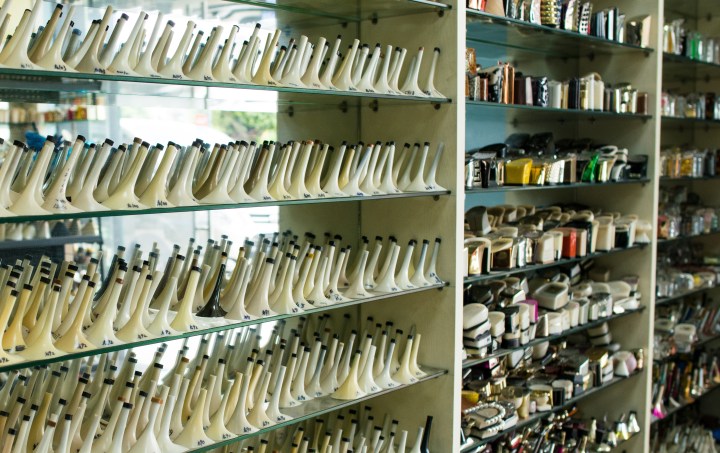
China’s struggling shoe components suppliers contemplate their futures
China’s struggling shoe components suppliers contemplate their futures

As part of a series on Communist China’s 70th anniversary, Marketplace’s China correspondent Jennifer Pak and Shanghai bureau news assistant, Charles Zhang, spoke to people in the country’s shoe industry – the world’s biggest – about their achievements and challenges over the last few decades. You can read more stories from the China 70 series here.

Ivan Chen, 38
Title: Owner of Xiexing Leather, which produces textiles for shoes and handbags
Main markets: Europe 70%, U.S. 30%
Years in the industry: 12

Huang Tengfei, 24
Title: Shopkeeper at Jingjian Zipper which sells zippers for handbags, shoes and clothing
Main markets: About 70% to 80% of the business is in China
Years in the industry: 7

Mo Ruiyong
Title: Owner of Hongjia Shoe Materials, which produces shoe heels
Main markets: U.S. and Africa
Years in the leather: 10
How is business going?
Chen: It was difficult when I started the business in 2010. I didn’t have many customers, but things got better through some hard work. Then in 2012, I received fewer orders because of the global economic slowdown. Business picked up again in 2015. Then orders have shrunk in the last couple of years due to various reasons.
[Marketplace note: The U.S.-China tariff war has made the economy a sensitive topic for the Chinese Communist party so many people in the manufacturing industry are reluctant to speak openly to foreign media.]
Huang: Business was not good during the global financial crisis in 2008 and the global economic downturn 2012. Currently, business is only so-so.
Mo: Business was good about seven years ago when we had many orders from the U.S. and Africa. However, business has been difficult over the last several years because the economic environment is not good. Before one order size was in the tens of thousands of pairs of heels. Now, we’re lucky if we get an order for 10,000 pairs of heels.

Does the trade war impact on your business?
Chen: There has been some impact from the trade war, but it is not a big one since we are a top supplier for our American customers. If there are no big changes to the European market, then my business will be fine.
Huang: I am not sure if it has because while my clients are mainly Chinese, I do not know where the final products are exported to.
Mo: Yes. Most of my clients are still from the U.S. President Donald Trump keeps flip flopping. He threatens additional tariffs today, then delays them tomorrow. This uncertainty makes our American clients hesitate to place orders, and Chinese trading companies also hesitated to take orders from the U.S.

How do you see your future?
Chen: I am developing biodegradable leather and more environmentally-friendly material to stay competitive. But the shoe industry is on its way out of mainland China. I am not sure if I will continue to manufacture these products in five to 10 years time. There may will be even fewer orders and the competition will be fiercer. Currently I have tens of thousands of competitors from across China.
Huang: I have no other plans. I will stay in this business as long as I can because I don’t know how to do anything else.
Mo: I am not sure. It is a confusing time. Everybody is struggling to just survive and in the meantime look for other business opportunities. I hope the trade war mess will stop so that the U.S. and China can develop peacefully together.

How do you feel as China celebrates 70 years under Communist rule?
Chen: My life has improved a lot compared to my parents’ generation.
Mo: Our life is getting better and better. Kids today are much happier than my generation was. For example, families can go on vacation now. When I was a child, the farthest my parents took me was to the town center. So, our living standard has increased a lot.

President Donald Trump suggests that what China has achieved today is done by cheating on trade and he sees the Chinese as the big winners. Do you agree?
Chen: I haven’t felt this benefit that President Trump is speaking of. I am a businessman and I care about profit. I haven’t seen any change in that respect. In fact, my profit has decreased because my costs are increasing but I haven’t charged my clients more. I think American consumers should be very happy that they can buy good quality products at low prices. I went to the U.S. before and I liked buying clothes and shoes there. I checked the labels and they were labeled as “Made in China,” but I can’t buy the same type of quality at those prices in China.
[Marketplace note: People in the shoe and textile industry suggest that one of the reasons for this is because of China’s import tax on foreign goods. It could also be because U.S. brands are often sold at a premium in China because the Chinese public usually associate foreign goods with higher quality.]
Mo: We, the Chinese, earned our success today through hard work. We work long nights. Our workers do not complain to the labor bureau about excessive overtime. We work on weekends. We work on holidays. Unlike in America, where it has good human rights, free speech and workers can take vacations whenever they want, the Chinese are different.
There’s a lot happening in the world. Through it all, Marketplace is here for you.
You rely on Marketplace to break down the world’s events and tell you how it affects you in a fact-based, approachable way. We rely on your financial support to keep making that possible.
Your donation today powers the independent journalism that you rely on. For just $5/month, you can help sustain Marketplace so we can keep reporting on the things that matter to you.











